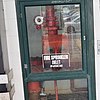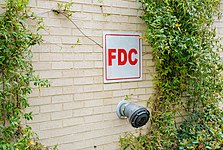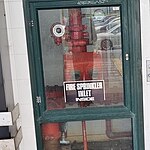Proposal:Building inlet
| Building inlet | |
|---|---|
| Proposal status: | Approved (active) |
| Proposed by: | Kylenz |
| Tagging: | emergency=fire_service_inlet fire_mains=yes/no/wet/dry fire_sprinkler=yes/no/wet/dry/pre-action fire_service_inlet=* |
| Applies to: | |
| Definition: | An inlet into a building's firefighting system |
| Statistics: |
|
| Draft started: | 2022-12-30 |
| RFC start: | 2022-12-30 |
| Vote start: | 2023-02-10 |
| Vote end: | 2023-02-24 |
Proposal
This proposal seeks to deprecate emergency=dry_riser_inlet and replace it with a more generic tag that supports other types of building inlets used by the fire brigade.
emergency=fire_service_inlet can be used to tag a Fire Department Connection (FDC), also called a Building Hydrant Inlet or a Fire Service Inlet. See ![]() Wikipedia. The fire brigade can connect a pressurized water source to these inlets to aid firefighting efforts. Common types of inlets include Dry Riser Inlets and Fire Sprinkler Inlets.
Wikipedia. The fire brigade can connect a pressurized water source to these inlets to aid firefighting efforts. Common types of inlets include Dry Riser Inlets and Fire Sprinkler Inlets.
Rationale
Currently, the wiki suggests using emergency=dry_riser_inlet for any kind of firefighting inlet[1][2], which is misleading given that the tag name includes the words "Dry Riser".
It's likely that many mappers aren't familiar with the different type of inlets, but there is no way of tagging an unknown type of building inlet. This may result in people using emergency=dry_riser_inlet to tag inlets that are not actually dry risers.
Tagging
Add a ![]() Node with emergency=fire_service_inlet. If you know the type of inlet, tag it with fire_mains=* and/or fire_sprinkler=*. See tables below.
Node with emergency=fire_service_inlet. If you know the type of inlet, tag it with fire_mains=* and/or fire_sprinkler=*. See tables below.
Some inlet panels will have two connections, so it is possible to have fire_mains=* and fire_sprinkler=* on the same node. See example 5 below.
| Tag | Description | Image | Taginfo |
|---|---|---|---|
| fire_mains=dry | A Dry Riser Inlet ( |

|
|
| fire_mains=wet | A Wet Riser Inlet or Charged Riser[6] is similar to a Dry Riser, except that the pipes are permanetly filled with water from a tank in the building or the city's water mains. The inlet allows the fire brigade to pump water into the system to supplement the normal water supply.[7][8] | 
|
|
| fire_mains=yes | A unknown type of Riser Inlet | ||
| Tag | Description | Image | Taginfo |
| fire_sprinkler=yes | A Fire Sprinkler Inlet is an inlet into a |

|
|
| fire_sprinkler=wet fire_sprinkler=dry fire_sprinkler=pre-action |
A Fire Sprinkler Inlet where the specific type of system is known. | |
Other sub-tags
- Couplings: Just like fire hydrants, it can be useful to add infomation about the coupling, such as couplings=*, couplings:type=*, and couplings:diameters=*.
- Position: It is assumed that hydrant inlets are attached to the wall by default. If not, you can add fire_service_inlet=* which has the same possible values as fire_hydrant:type=*.
- Substance: It is assumed that the inlet is for water. If not, you can add substance=*, for example foam.
Examples
emergency=fire_service_inlet + fire_mains=dry. "Dry Standpipe" is the American term for Dry Riser
emergency=fire_service_inlet. No subtag since the type of inlet is unclear
emergency=fire_service_inlet + fire_mains=wet + fire_sprinkler=yes. Two sub tags since this panel has two separate connection types. Alternatively, two separate
 Nodes could be used.
Nodes could be used.
Proposed Deprecations
Rendering
None proposed
Features/Pages affected
- emergency=fire_service_inlet create
- fire_mains=yes/no/wet/dry create
- fire_sprinkler=yes/no/wet/dry/pre-action create
- fire_service_inlet=* create
- emergency=dry_riser_inlet deprecate
- emergency=sprinkler_connection deprecate
- emergency=* update
- Emergency facilities and amenities update
- Brandschutz mit OSM update
- DE:Key:fire_hydrant:type update Löschwassereinspeisung section
External discussions
- "Tagging" mailing list 10-12 Dec 2022
- "Tagging" mailing list 30 Dec 2022
- Proposed features/Dry riser inlet 2017
- openstreetmap/id-tagging-schema/issues/642
- OSM Community 2022
Comments
Please comment on the discussion page.
Voting
Voting on this proposal has been closed.
It was approved with 26 votes for, 1 vote against and 0 abstentions.
 I approve this proposal. --Kylenz 01:03, 11 February 2023 (UTC)
I approve this proposal. --Kylenz 01:03, 11 February 2023 (UTC) I approve this proposal. Very detailed! --Fizzie41 (talk) 01:26, 11 February 2023 (UTC)
I approve this proposal. Very detailed! --Fizzie41 (talk) 01:26, 11 February 2023 (UTC) I approve this proposal. -- Something B (talk) 10:37, 11 February 2023 (UTC)
I approve this proposal. -- Something B (talk) 10:37, 11 February 2023 (UTC) I approve this proposal. --- Kovposch (talk) 11:02, 11 February 2023 (UTC)
I approve this proposal. --- Kovposch (talk) 11:02, 11 February 2023 (UTC) I approve this proposal. Really good proposal, thank you Fanfouer (talk) 13:45, 11 February 2023 (UTC)
I approve this proposal. Really good proposal, thank you Fanfouer (talk) 13:45, 11 February 2023 (UTC) I approve this proposal. seems preferable to using dry_riser_inlet for wet ones or having family of very_specific_inlet main tags Mateusz Konieczny (talk) 11:52, 12 February 2023 (UTC)
I approve this proposal. seems preferable to using dry_riser_inlet for wet ones or having family of very_specific_inlet main tags Mateusz Konieczny (talk) 11:52, 12 February 2023 (UTC) I oppose this proposal. the tag emergency=dry_riser_inlet is not defined for all kind of inlets as you write, it's definition for dry riser inlets was approved through voting and there is no benefit from deprecating it in favor of a tag that requires additional tags in order to convey the same information, you should rather propose tags that are compatible with the current way of tagging similar things then deprecated existing tagging. --Dieterdreist (talk) 23:09, 12 February 2023 (UTC)
I oppose this proposal. the tag emergency=dry_riser_inlet is not defined for all kind of inlets as you write, it's definition for dry riser inlets was approved through voting and there is no benefit from deprecating it in favor of a tag that requires additional tags in order to convey the same information, you should rather propose tags that are compatible with the current way of tagging similar things then deprecated existing tagging. --Dieterdreist (talk) 23:09, 12 February 2023 (UTC)
- Hi, having 4 different top-level tags forces people to pick one option, which creates a risk that someone will pick the wrong option because they don't understand the difference, especially since this is a very technical topic. There are a few other benefits too which we talked about over email and on the forum. And it makes it impossible to map an building inlet with an unknown type, which is common when the signage is vague, like in the example photos. Nearly all tags in OSM follow the system where a main tag can have optional subtags. So I think it makes sense to do the same here... --Kylenz 05:58, 13 February 2023 (UTC)
- I don’t oppose introducing a generic value and tags for wet risers or sprinkler inlets, I just don’t see why deprecation of the dry riser tag is needed and I believe the benefit is smaller than the disruption and problems that generally accompany deprecation. —-Dieterdreist (talk) 11:35, 13 February 2023 (UTC)
 I approve this proposal. --Nw520 (talk) 10:51, 13 February 2023 (UTC)
I approve this proposal. --Nw520 (talk) 10:51, 13 February 2023 (UTC) I approve this proposal. thank you for this great proposal --Gendy54 (talk) 11:27, 13 February 2023 (UTC)
I approve this proposal. thank you for this great proposal --Gendy54 (talk) 11:27, 13 February 2023 (UTC) I approve this proposal. Babouche Verte (talk) 12:34, 13 February 2023 (UTC)
I approve this proposal. Babouche Verte (talk) 12:34, 13 February 2023 (UTC) I approve this proposal. --Ydel (talk) 14:20, 13 February 2023 (UTC)
I approve this proposal. --Ydel (talk) 14:20, 13 February 2023 (UTC) I approve this proposal. --Rskedgell (talk) 07:33, 14 February 2023 (UTC)
I approve this proposal. --Rskedgell (talk) 07:33, 14 February 2023 (UTC) I approve this proposal. well done --Map HeRo (talk) 22:00, 14 February 2023 (UTC)
I approve this proposal. well done --Map HeRo (talk) 22:00, 14 February 2023 (UTC) I approve this proposal. --快乐的老鼠宝宝 (talk) 12:13, 15 February 2023 (UTC)
I approve this proposal. --快乐的老鼠宝宝 (talk) 12:13, 15 February 2023 (UTC) I approve this proposal. --Hholzgra (talk) 18:30, 15 February 2023 (UTC)
I approve this proposal. --Hholzgra (talk) 18:30, 15 February 2023 (UTC) I approve this proposal. --501ghost (talk) 02:35, 17 February 2023 (UTC)
I approve this proposal. --501ghost (talk) 02:35, 17 February 2023 (UTC) I approve this proposal. Deprecating a previously approved tagging scheme is fine in this case IMO, since there are not that many uses, and the new tagging scheme is clearly much more versatile. Also, better deprecate one instead of having two competing or incompatible tagging schemes. --Flo Edelmann (talk) 12:46, 19 February 2023 (UTC)
I approve this proposal. Deprecating a previously approved tagging scheme is fine in this case IMO, since there are not that many uses, and the new tagging scheme is clearly much more versatile. Also, better deprecate one instead of having two competing or incompatible tagging schemes. --Flo Edelmann (talk) 12:46, 19 February 2023 (UTC) I approve this proposal. --Kjon (talk) 12:53, 19 February 2023 (UTC)
I approve this proposal. --Kjon (talk) 12:53, 19 February 2023 (UTC) I approve this proposal. --Timonade (talk) 14:57, 19 February 2023 (UTC)
I approve this proposal. --Timonade (talk) 14:57, 19 February 2023 (UTC) I approve this proposal. --EneaSuper (talk) 15:36, 19 February 2023 (UTC)
I approve this proposal. --EneaSuper (talk) 15:36, 19 February 2023 (UTC) I approve this proposal. --Jmarchon (talk) 16:35, 19 February 2023 (UTC)
I approve this proposal. --Jmarchon (talk) 16:35, 19 February 2023 (UTC) I approve this proposal. --Chris2map (talk) 21:15, 20 February 2023 (UTC)
I approve this proposal. --Chris2map (talk) 21:15, 20 February 2023 (UTC) I approve this proposal. Adamant1 (talk) 00:37, 21 February 2023 (UTC)
I approve this proposal. Adamant1 (talk) 00:37, 21 February 2023 (UTC) I approve this proposal. More specific and granular than the previous approved tagging (that was a good base nevertheless) and therefore a future-proof proposal. Thanks for that. However, the topic of "data migration" comes too short in my opinion - it would be good to support the migration process with targeted activities (e.g. contacting mappers who mapped lot of inlets in the past, get in contact with emergency data users, creating mapping/retagging challenges, etc.). I will definitely update inlets of this kind I mapped in my area. --Supaplex030 (talk) 21:47, 21 February 2023 (UTC)
I approve this proposal. More specific and granular than the previous approved tagging (that was a good base nevertheless) and therefore a future-proof proposal. Thanks for that. However, the topic of "data migration" comes too short in my opinion - it would be good to support the migration process with targeted activities (e.g. contacting mappers who mapped lot of inlets in the past, get in contact with emergency data users, creating mapping/retagging challenges, etc.). I will definitely update inlets of this kind I mapped in my area. --Supaplex030 (talk) 21:47, 21 February 2023 (UTC)
- Hi Supaplex030, I'll definitely make an effort to encourage migration. Happy to discuss if you have specific ideas. At the very least, I endeavour to update the wiki, editor presets, and get in touch with some of the most prolific mappers of emergency=dry_riser_inlet. I am not aware of any software that uses the old tags[9] --Kylenz 02:59, 25 February 2023 (UTC)
 I approve this proposal. --Rempshaener (talk) 20:58, 22 February 2023 (UTC)
I approve this proposal. --Rempshaener (talk) 20:58, 22 February 2023 (UTC) I approve this proposal. --TheBlackMan (talk) 17:42, 23 February 2023 (UTC)
I approve this proposal. --TheBlackMan (talk) 17:42, 23 February 2023 (UTC)
References
- ↑ Tag:emergency=dry_riser_inlet
- ↑ Brandschutz mit OSM
- ↑ https://www.bbc.com/news/uk-44351567
- ↑ https://fireandemergency.nz/assets/Documents/Business-and-Landlords/Building-and-designing-for-fire-safety/F5-05-GD-FFO-Building-hydrant-systems-DRAFT.pdf
- ↑ https://www.adelaidefireengineers.com/post/dry-hydrant-risers
- ↑ https://www.quora.com/What-is-the-difference-between-a-wet-riser-and-a-charged-riser-both-are-fire-protection-systems
- ↑ https://fireandemergency.nz/assets/Documents/Business-and-Landlords/Building-and-designing-for-fire-safety/F5-05-GD-FFO-Building-hydrant-systems-DRAFT.pdf
- ↑ https://completepumpsandfire.com.au/dry-riser-fire-system/
- ↑ https://taginfo.openstreetmap.org/tags/emergency=dry_riser_inlet#projects



